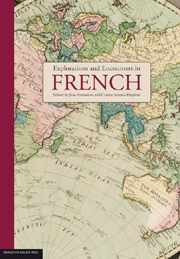Book contents
- Frontmatter
- Contents
- Foreword and Acknowledgements
- Expressions of Support
- Editors' Note
- Encountering French and the French
- Historical Explorations
- Intercultural Encounters
- Explorations in the Classroom
- Les TICE: de nouveaux outils pédagogiques
- Promoting Collaborative Learning with IdeaNet: A Francophone Literature Case Study
- Délier la langue d'étudiants “captifs”: enjeux, écueils et for tunes d'un cours d'expression orale à l'université
- Table of Illustrations
- Appendix 1 Conference History
- Appendix 2 Contents of the CD-ROM
Promoting Collaborative Learning with IdeaNet: A Francophone Literature Case Study
from Explorations in the Classroom
Published online by Cambridge University Press: 05 June 2012
- Frontmatter
- Contents
- Foreword and Acknowledgements
- Expressions of Support
- Editors' Note
- Encountering French and the French
- Historical Explorations
- Intercultural Encounters
- Explorations in the Classroom
- Les TICE: de nouveaux outils pédagogiques
- Promoting Collaborative Learning with IdeaNet: A Francophone Literature Case Study
- Délier la langue d'étudiants “captifs”: enjeux, écueils et for tunes d'un cours d'expression orale à l'université
- Table of Illustrations
- Appendix 1 Conference History
- Appendix 2 Contents of the CD-ROM
Summary
In 2003, the Arts Faculty at The University of Western Australia underwent a major restructure involving the distribution of points for its units of study. In the previous model each unit was worth eight points while in the revised version units could be weighted at either 6 points or 12 points. For French Studies, this redistribution of points resulted in the creation of a new series of upper level elective units. Students must take at least two of these units over two years in order to complete a major in French. A distinguishing feature of these electives is that they can contain up to five different language levels, ranging from students who have only completed one year of French (ex-beginners) all the way up to native speakers. The vast disparity in students' command of French has provided challenges both for the lecturers and for the students, particularly regarding the promotion of active learning across all language levels. This paper explores a multimedia innovation called IdeaNet, developed by the Arts Multimedia Centre at The University of Western Australia, as one way to combat the problems of mixed level classes and to foster an effective learning environment for all.
The problem of mixed level classes is common in many disciplines, although it can be particularly significant when learning a foreign language. Antonia Rubino, a lecturer in Italian at the University of Sydney, argues that two principal considerations are necessary when dealing with different abilities within the same classroom.
Information
- Type
- Chapter
- Information
- Explorations and Encounters in French , pp. 227 - 250Publisher: The University of Adelaide PressPrint publication year: 2010
Accessibility standard: Unknown
- 1
- Cited by
